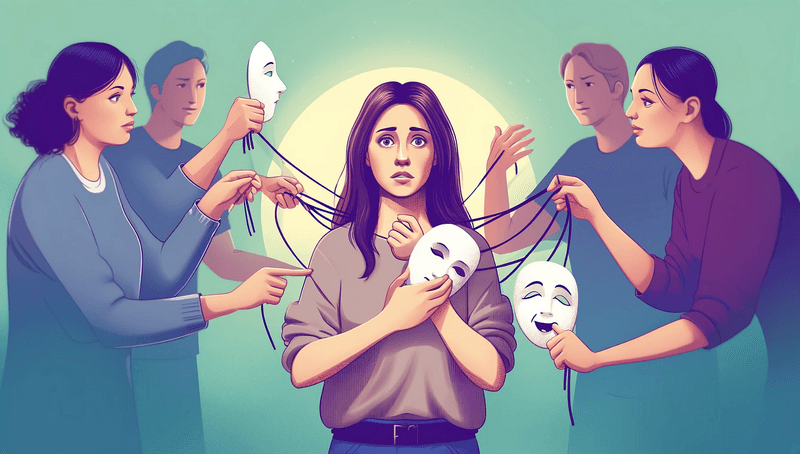Here’s the wild truth no one tells you: your childhood survival skills can become your adult sabotage habits. I said what I said.
And if you, like me, grew up in a household where “emotions” were things to shove under the rug next to the vacuum cleaner no one ever used, then girl… this post might feel like a full-body flashback.
As kids in dysfunctional families, we developed these weird little emotional costumes—roles we slipped into to avoid explosions, win affection, or simply stay invisible.
But guess what? Those costumes don’t magically come off once we’re grown. They follow us. Into our friendships. Our careers. And oh yes—right into our marriages.
Now, as a wife who has done her fair share of emotional excavating, I’ve seen how these roles sneak into our relationships and play out like reruns of an old sitcom we never meant to subscribe to.
But don’t worry, we’re about to name them, laugh at them, cry a little, and maybe—just maybe—start rewriting the script.
1. The Fixer Who Can’t Sit Still
Ever caught yourself reorganizing the pantry at 2 a.m. instead of sleeping? Yeah, that’s the Fixer energy in action. There’s something about keeping your hands busy that quiets the noise inside. Fixers can’t stand stillness because, as kids, chaos meant danger and quiet felt like a trap.
So now, even the smallest problem feels like a life-or-death mission. I’ve color-coded the spice rack more times than I care to admit, just to catch my breath. It’s about control, not the cinnamon.
Partners, the best thing you can do is offer a quiet hug and remind us action doesn’t always look like cleaning. Sometimes, just being held is enough to convince our racing hearts we’re safe—at least for tonight.
2. The Pleaser Who Says Yes While Screaming No Inside
You know that friend who always lets the group pick dinner—Chinese, Thai, tacos, anything except what she actually wants? Well, she’s not just easygoing—she’s the Pleaser. Growing up, saying no felt risky. Pleasers learned to blend in, smooth things over, and keep everyone happy, even if it meant swallowing their own needs whole.
Inside, it’s a storm of resentment and exhaustion. I’ve nodded along to so many plans I hated, just to avoid a fight or a sigh.
A true act of love? When someone pauses and says, ‘But what do YOU want tonight?’ It feels like magic. For Pleasers, being asked and heard feels like being seen for the first time in forever.
3. The Over-Achiever Who’s Secretly Terrified of Rest
Sunday afternoon: everyone else is napping or binge-watching trash TV, and you’re alphabetizing your emails. Welcome to the Over-Achiever’s club. We grew up treating achievement like currency—good grades, gold stars, and the hope that maybe this time, it would finally be enough.
Agora, we can’t relax without feeling like we’re failing. Rest feels like slacking, even when we’ve earned it.
The most romantic words I ever heard? ‘You’ve done enough today.’ A partner who can help us slow down, put the to-do list away, and just exist, gives us permission to breathe—without earning it first. Sometimes, stillness is the bravest thing we can do.
4. The Ghost Who Disappears Emotionally
Some folks can vanish from a conversation without ever leaving the room. That’s the Ghost. I’ve been guilty of mentally moonwalking away the minute things get ‘too real.’ Vulnerability used to feel like walking into traffic—so we vanished instead.
It’s not about not caring; it’s about ancient self-protection. Emotional absence was our cloak when things got heated.
If you love a Ghost, patience and gentle presence make all the difference. When our partners keep showing up and don’t push, slowly, we peek out from behind our disappearing act. Emotional safety is a long game, and every small step is a win.
5. The Critic Who’s Hard on Herself (and You Too, Sorry)
Ever catch yourself nitpicking your partner’s shirt, your own hair, or the way the toast is cut? That’s the Critic talking. We grew up with voices that pointed out every flaw—so now, we do it too. The inner dialogue is relentless: ‘Not good enough.’
Sometimes, it spills out and stings the ones closest to us. It’s not about them; it’s our own old tape playing on repeat.
Want to break the cycle? Humor helps more than anything. The day my husband asked, ‘Would you say that to Beyoncé?’ I lost it. Laughter interrupts the spiral of criticism better than any pep talk ever could.
6. The Martyr Who Does Everything (And Resents You for It)
Oh, the Martyr. The crown is heavy and the to-do list never ends. We do it all—cooking, cleaning, managing chaos—then simmer in quiet resentment when no one notices or helps.
It started as a way to earn love or avoid conflict. Now, the weight feels like a full-time job. We want help, but asking feels impossible, so instead we explode over socks on the floor.
Partners who step in without being asked? Bless you. The magic words: ‘Let me take something off your plate’ (and yes, you get bonus points for literal AND figurative plates). Teamwork chips away at the loneliness and makes room for actual partnership.
7. The Cynic Who Prepares for Heartbreak
Optimism? Please. We, the Cynics, have backup plans for backup plans in case the sky falls. Childhood taught us to be wary of ‘too good to be true.’ Trust feels like a setup for disappointment.
When something goes well, we’re already bracing for the shoe to drop. It’s exhausting, but it feels safer than hoping.
The game-changer? Consistent truth-telling and reliability. Every time someone shows up, follows through, and proves us wrong, a little bit of armor slips away. Cynics don’t need grand gestures, just steady truth and a safe place to let our guard down.
8. The Comedian Who Deflects With Laughter
You ever met someone who can’t go five minutes without a one-liner, even at a funeral? Hi, that’s the Comedian. We sharpened our wit to keep tears (and fights) at bay. If everyone’s laughing, no one’s yelling—or crying.
It’s a clever shield, but it can get lonely behind the punchlines. Underneath all that humor? A tender, scared heart that wants to be taken seriously every once in a while.
Real intimacy starts when someone says, ‘You don’t have to be funny all the time.’ When our partners give us room to be serious, it changes everything. Sometimes, the bravest thing is letting that guard down.
9. The Perfectionist Who Can’t Tolerate Mess (Especially Emotional Mess)
The Perfectionist in me would alphabetize the air if it were possible. Mess—especially emotional mess—makes us itch. We grew up believing that being flawless was the only way to feel safe or accepted.
Now, we panic if the towels aren’t folded just right or if feelings get too messy. Control is our comfort zone, chaos is terrifying.
The best kind of love? Someone who lets us unravel a little without judgment. When a partner says, ‘It’s okay to fall apart here,’ and sticks around through the ugly cry, it’s healing in ways words never are. Sometimes, letting go means letting love in.
10. The Lone Wolf Who Sucks at Asking for Help
Lone Wolves like me act like asking for help will burn the house down. Independence was our shield growing up—we learned not to rely on anyone, just in case.
So we haul all the groceries at once, fix our own flat tires, and suffer in silence. Accepting support feels as risky as skydiving without a parachute.
But when someone says, ‘I want to be there for you,’ and actually shows up, it chips away at our stubborn armor. Bit by bit, we start to trust that maybe, just maybe, help doesn’t always come with strings attached.
11. The Caretaker Who Forgets She Has Needs Too
Caretakers are pros at tending everyone’s needs but their own. If you’re thirsty, I’ll hand you tea before I pour my own. Growing up, we were taught to put out every fire except the ones inside ourselves.
The result? Chronic exhaustion, resentment, and the sneaky suspicion that we don’t even know what we want anymore.
Partners who gently ask, ‘What would feel good for you right now?’ are rare gems. Those little check-ins are like a soft blanket on a cold day. Slowly, we learn it’s okay to fill our own cup, too.
12. The Hero Who Can’t Show Weakness
The Hero is always first to the rescue, cape tucked under her blazer. We learned early that saving the day was the only way to be valued. Weakness? Not allowed. So we hustle, fix, and lead—even when we’re falling apart inside.
It’s hard to admit when we need help or a break. Vulnerability feels like defeat, even when we know better.
But the right partner can help melt that armor. When someone quietly says, ‘You don’t have to be strong for me,’ it feels like a safety net. Sometimes, letting someone else hold it together is the real strength.
13. The Rebel Who Pushes Love Away Just to Feel in Control
If you’ve ever picked a fight just to make sure your partner still cares, welcome to the Rebel club. We learned to test boundaries and push people away before they could hurt us. Control feels safer than closeness.
It’s a wild ride—passion and pushback all tangled together. Underneath, there’s fear: if you get too close, you’ll see the mess and leave.
The bravest partners don’t flinch when we’re difficult. They say, ‘I love you anyway.’ That steady love? It’s how we finally believe that staying is possible, even when we’re at our most unlovable.
14. The Invisible One Who’s Used to Being Overlooked
Some of us became experts at fading into the wallpaper. As ‘the Invisible One,’ our survival trick was to be small, quiet, and easy to ignore. Attention felt risky—so we hid, went unnoticed, and let our victories slip by in silence.
Adulthood brings the same patterns. We dodge the spotlight, minimize our wins, and swallow our needs, afraid of being ‘too much.’
The right partner will pull us gently into the sun. When someone celebrates us, even in small ways, it feels like a miracle. Every bit of recognition is a dose of courage for the next time.
15. The Rule-Follower Who Needs Permission to Be Free
If coloring outside the lines still makes you sweat, you might be the Rule-Follower. We grew up believing that breaking rules led to disaster. Spontaneity? Not in our vocabulary. Safety was found in predictability, not play.
Now, we cling to routines and hesitate to try new things, worried about doing it ‘wrong.’ Freedom feels foreign, but a little part of us longs for it.
When loved ones invite us to do something wild—and we’re not punished for it—it’s like tasting freedom for the first time. Slowly, we learn that joy doesn’t need permission.
















